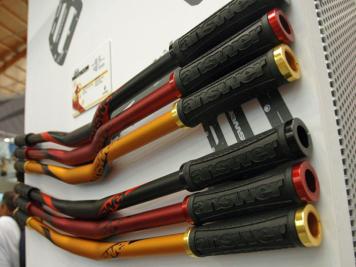For all of you who wondered how a carbon bicycle frame is made, we have some pictures from a recent visit to the factory of the vendor who makes our frames for us. Enjoy!

This mold is a guide to make sure that part is being shaped correctly around the bladder. This one is for a Titus chainstay.

These shelves a filled with tools that help to ensure perfect frame alignment for the frames that are built using the tube-tube construction method.

Once the raw carbon is formed around its bladder, it is then placed into one of these clam shell molds where under heat and pressure it will take it’s final shape. Here we are looking at the front half of an X carbon front triangle.

This is the mold for the back half of the X Carbon front triangle. The X carbon is constructed by using the tube-tube method.

An FTM carbon frame getting ready to go into the curing press.

Once the frame is carefully placed in the mold it is closed up and moved on to the ovens. These molds are extremely heavy and require a lift to place into the press.

This is the press that applies and incredible amount of pressure and heat to form the frame into its final shape.

After the frames come out of the molds they then go to the machine shop so the aluminum inserts like the bottom bracket can be reamed, tapped and faced.

The frames then go over to sanding where they get any extra resin from molding is removed and the frame is made to be as smooth as possible and any imperfections are filled.

Prior to shipping every frame goes through extensive stiffness testing. This not only ensures that the frames are meeting our stiffness standards, but also that all the frames in this batch are consistent in their carbon lay-up and quality. This machine is testing the stiffness at the head tube.

Frames also are placed on this testing machine which simulates real world riding conditions.

Before a frame ever makes it into production it must undergo exhaustive fatigue testing. This non-titus frame is currently experiencing a bottom bracket fatigue test.



























